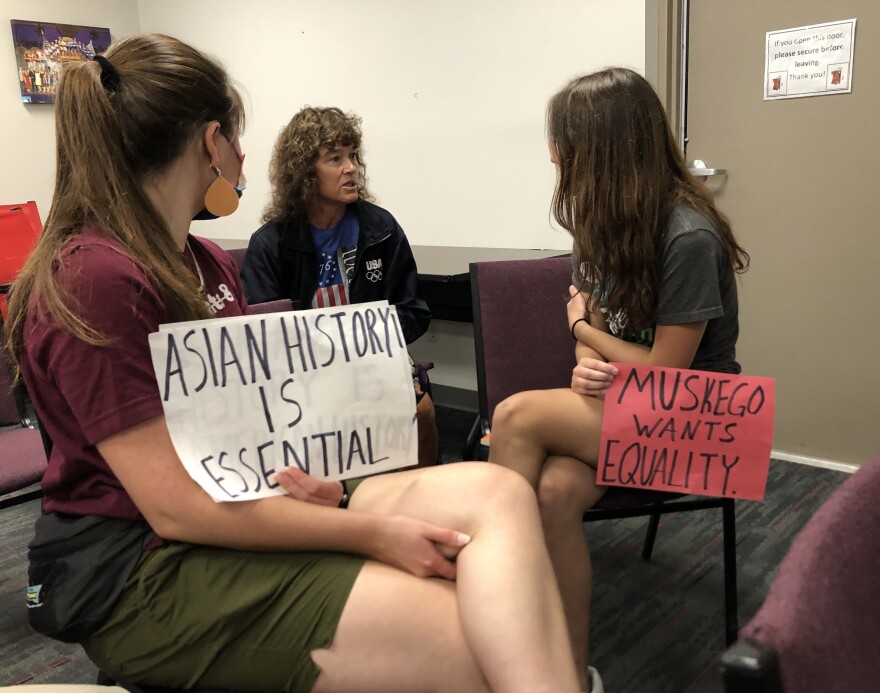The Asian American Pacific Islander Coalition of Wisconsin is renewing its call for legislation mandating AAPI education in schools, following a curriculum controversy in the Waukesha County suburb of Muskego.
In June, a Muskego-Norway School Board committee refused to include a novel about Japanese American wartime internment in an accelerated English class.
The AAPI coalition says it’s an example of why Wisconsin needs to pass a law requiring schools teach about Asian American history and culture.
The book at issue in Muskego is When the Emperor Was Divine by Japanese American author Julie Otsuka. The novel follows a Japanese American family incarcerated by the American government during World War II.

Kabby Hong, the first Asian American Wisconsin Teacher of the Year, spoke at a rally organized by the AAPI Coalition of Wisconsin Monday, in front of Muskego school district offices.
"We need more of these stories in our schools, not less," Hong said. "Books serve as both a window and mirror for kids. They serve as a window because they’re able to see the lived experiences of somebody who is different than them. ... Books also serve as a powerful mirror for kids to be able to see themselves in curriculum, many for the very first time."
School boards have become political battlegrounds in Wisconsin and other states, with many conservative candidates expressing opposition to diversity and inclusion efforts.
A recent Muskego High School grad, Ellie Catania, drew a comparison to school districts across the country — where books about diverse perspectives or painful chapters in American history are increasingly being challenged.

"Since a very young age, we have all been taught not to judge a book by its cover," Catania said. "Yet I fear those engaging in book restricting practices are in fact judging books by their authors, titles and subject matters."
School board members defend decision
The official statement from the Muskego-Norway School Board is that there might have been discrimination during the book selection process, which is why Otsuka’s novel wasn’t approved.
Member Kevin Zimmerman said in an email that school staff were allegedly told to choose a book by a nonwhite author.
"Our policy states selection of instructional materials shall not discriminate on the basis of any characteristics protected under State or Federal law," Zimmerman wrote. "Concerns were raised about whether this policy was followed."
Superintendent Kelly Thompson hasn’t responded to that allegation.

Ann Zielke, a Muskego parent who has kept close tabs on the controversy, is asking, where’s the evidence that happened? And, why would it be a problem?
"I don’t see choosing an author of color to add diversity to the curriculum as a negative," Zielke said. "I see it as a positive. I see it as a best practice."
School board members have other concerns with the novel as well. Member Laurie Kontney said she read it and didn’t like it. She also pointed out that there are other readings in the same class that deal with Japanese internment.
"And I would rather see a piece where they compare and contrast — look at some other atrocity or something that challenged the human spirit," Kontney told WUWM. "So that you could have a discussion about the comparisons, that was my thought process and my decision-making."
The school board met Monday, after the rally protesting members’ decisions. The board didn’t discuss the book and didn’t take public comment on it.

A recent Muskego grad, Chloe Adamson, questioned Kontney about her decision after the meeting. Adamson said the book was important to help students understand an Asian American point of view.
"And you know what, that’s a great topic to be talking about in a history class or a current events class. Or in different classes that you have to talk about history, and knowing that we need to talk about our bad things we've done in our history so we don't repeat them," Kontney responded. "This is an English class."
"I totally agree, but here's the difference from a history class to an English class: is when you read history, you can read statistics, you can look at the facts, but you don't get that sense of empathy," Adamson said.
"But this is also fiction — so you understand that," Kontney said.
Kontney said the exchange didn’t change her mind — she said if students want to read more about Japanese internment, history class would be a better venue than English class.
Some Muskego parents are supporting the school board. Emily Frittitta thinks the board was acting in good faith by questioning whether the book was the right choice for the English class. She thinks protestors, on the other hand, are vilifying the board.
"There's no purpose in villainizing each other — especially making that board seem racist or whatever," she said. "They're the check on administrators or teachers ... and I don't think our community would [vote] for white supremacists and people who hate Asians."
Muskego school staff are redoing the novel selection process, and will bring that recommendation back to board members in the future.
Have a question about education you'd like WUWM's Emily Files to dig into? Submit it below.
_






